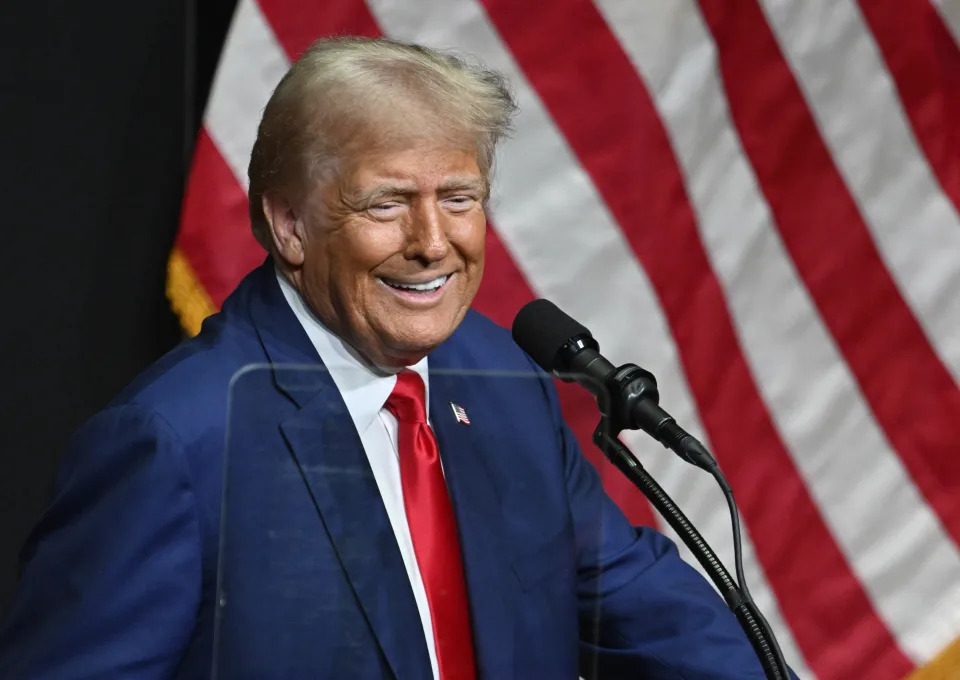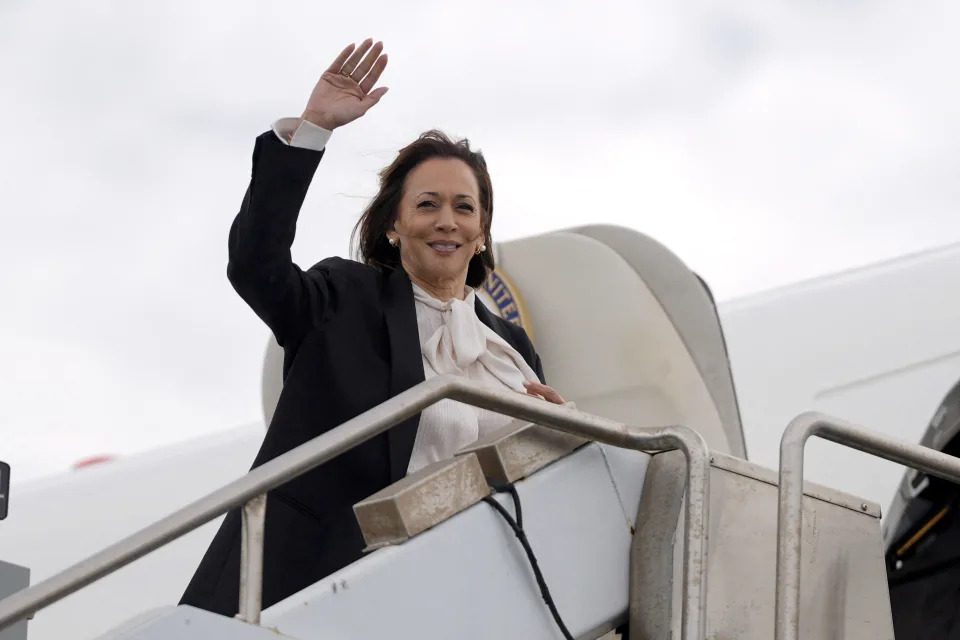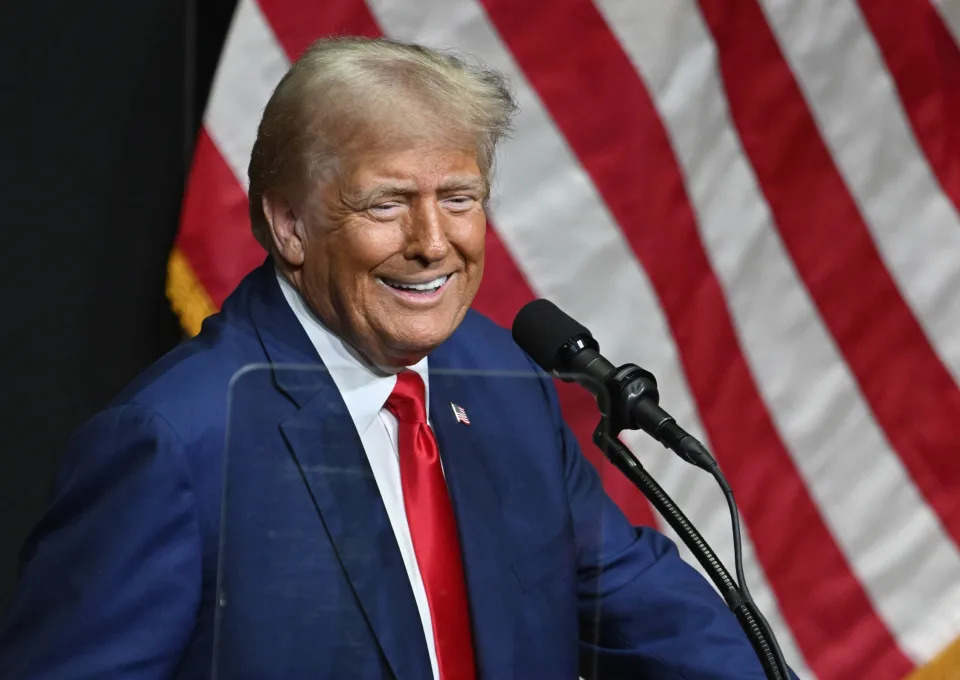The fact that inflation is now below 3% for the first time since 2021 is complicating Donald Trump’s ongoing effort to critique Kamala Harris’s economic record.
The Consumer Price Index (CPI) dropped below that threshold in July, according to data released Wednesday, showing an annual increase of 2.9% — down from 3% in June.
This latest sign of progress on price is clearly helpful to the vice president as Harris tries to distance herself from some unpopular aspects of Joe Biden's economic record and set her own economic platform this week.
But it is making Trump’s task more challenging as he tries to keep inflation front and center in the 2024 campaign.
The increasingly complicated dynamic was in evidence Wednesday evening when Trump traveled to Asheville, N.C., for a speech on the economy.

Trump focused for much of his address — as he and his fellow Republicans have done for months — on the overall 20% increase in prices since Biden and Harris took office.
But at one point, he couldn't avoid this week's good inflation news.
"Now, eventually, it's starting to maybe get under control," he acknowledged before quickly highlighting areas like car insurance, where prices have jumped in dramatic fashion over the last three and a half years.
Elsewhere in the speech, Trump appeared more eager to talk about other subjects and strayed often from his prepared remarks to focus on things ranging from immigration to a recent Time Magazine cover featuring Harris.
At one point, Trump even said of the economy, "They say it's the most important subject, I'm not sure it is."
It was a mixed message from Trump that illustrated his challenge in both finding attack lines on Harris that will stick in the minds of voters as well as making an economic case against her in the face of a resilient economy that has continued to outperform in many respects.
The challenges for Trump also come as Harris spends the week seeking to define herself more fully on the economy.
The vice president will give a much-anticipated address on Friday — also in North Carolina in nearby Raleigh — where she will be focused on issues like prices at the grocery store and "corporate price-gouging."
A focus on 'Kamalanomics'
On Wednesday, Trump's campaign also fully rolled out its effort to brand the Harris agenda as one of "Kamalanomics" — an echo of the "Bidenomics" label that the Biden team first embraced but is now more commonly used derisively by Republicans.
The effort comes after months of Trump suggesting that he doesn't believe the official numbers on inflation.
"They like to say 20%, 29%, 26%, 31%," he said at a recent campaign stop in Florida . "I think your real inflation is way over 50% and I believe that."
He added a charge during a rally in Minnesota that Harris "created the worst inflation in half a century, I believe the worst inflation that we've ever had."
There's evidence outside of a few specific items to back up Trump's claim of 50% inflation. Indeed, most GOP reactions to this week's inflation print focused on the official numbers and highlighted the 20% rise since Biden and Harris took office as well as areas where prices have risen especially quickly from baby food to gasoline.
But what clearly vexes Trump and his fellow Republicans is new evidence this week that voters may give Harris leeway on some aspects of Biden's unpopular economic record.
A much-discussed Financial Times/University of Michigan poll released this week found Americans now narrowly trust Kamala Harris by 42% to 41% to handle the US economy over Donald Trump.
This is a dramatic reshuffling of the race from when Biden was the candidate, with 60% of voters in the survey saying Harris should either break completely from the president's economic policies or "make major changes" to them.

A crucial interest rate decision next month
As for economic debates and the 2024 campaign trail, the political glare is likely to only increase in the coming weeks, with the Federal Reserve seemingly poised to cut rates at its next meeting on Sept. 17-18 as long as inflation continues to moderate.
Just this week, US producer prices also increased less than expected . That reading, paired with the Consumer Price Index, appeared to offer further data to support a rate cut in September. Traders are now projecting cuts in September as a virtual certainty .
Such an action would surely reverberate across the campaign trail, with Republicans from Trump on down sure to cast the move as caving to election year pressure.
The independence of the Fed has already emerged as a key campaign trail issue .
In an interview with Bloomberg published earlier this month, the Republican nominee and former president again reiterated that central bank officials should not ease monetary policy before the November election.
"It's something that they know they shouldn't be doing," Trump said.
Ben Werschkul is Washington correspondent for Yahoo Finance.


